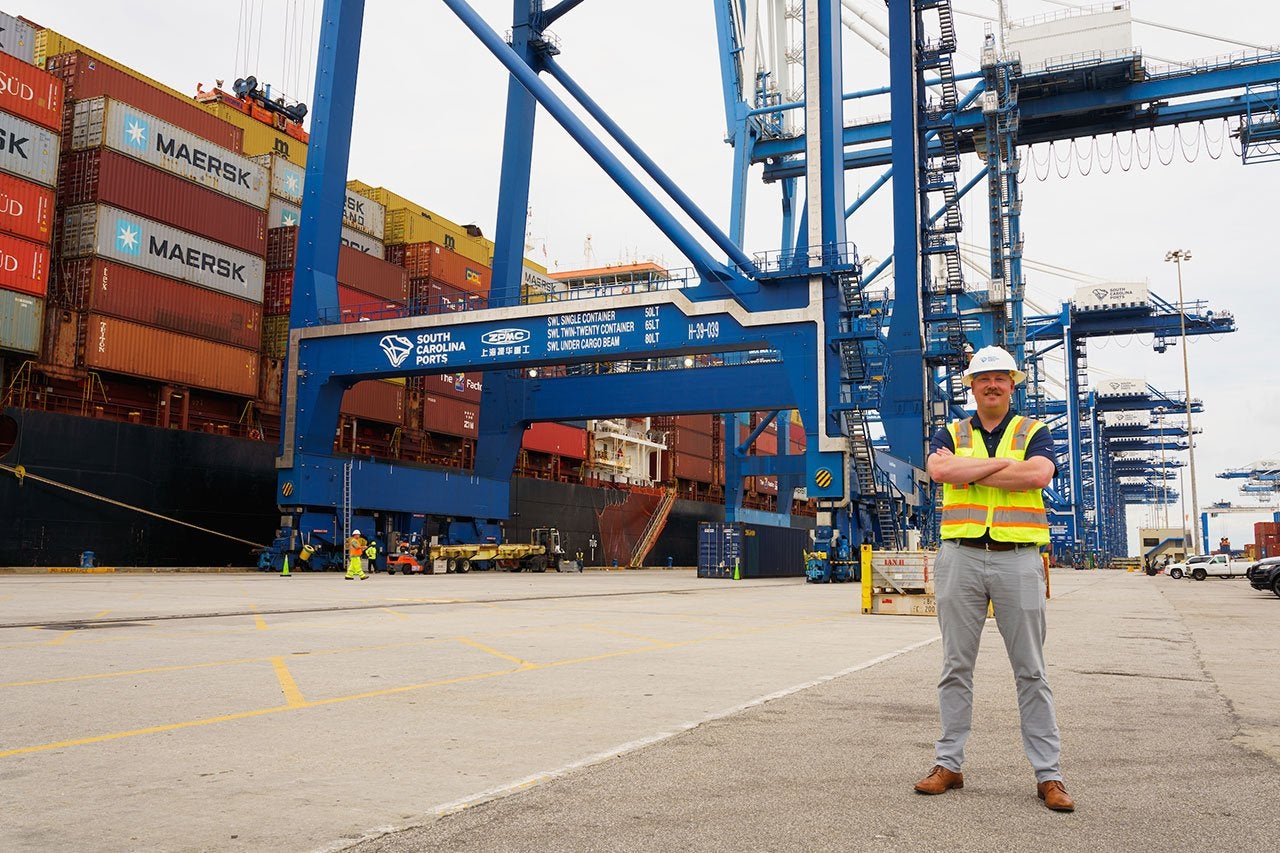The supply chain involves a great deal of overseas transportation, so what could be more natural than a former active-duty Coast Guard officer pursuing a career in it?
A nontraditional student attending the College of Charleston on the Post-9/11 GI Bill, Jeptha Tanksley, 32, was in the Coast Guard for five-plus years, stationed up and down the East Coast. He is now a part of the Coast Guard’s Select Reserve in Charleston and is just finishing up an eight-week internship in the marketing and sales department for the South Carolina Ports. An Atlanta native, he hopes to work in the maritime realm of supply chain and logistics after he graduates in May of 2023.
The College Today caught up with Tanksley to find out about his years in the Coast Guard, why he came to the College and what he plans to do with his degree.
What have you learned during your internship?
I’ve learned an incredible amount about the way cargo flows through our state, and how South Carolina Ports facilitates that movement. Working with the marketing and sales team has given me the opportunity to see many different aspects of the port and what happens here. I’ve also learned that South Carolina Ports is a huge driver of economic prosperity in the state, and it’s been amazing to be part of a team with such an impact.
Why did you decide to major in supply chain management?
I luckily chose supply chain management and global logistics and transportation before COVID was even a thing. I saw the potential opportunities in the field and thought that it would be a smart choice for a career with broad knowledge. Supply chains and logistics will always be critical, and having the opportunity to focus on that specifically with my major and minor was perfect.
What do you find most interesting about the industry?
I find the interactions between seemingly totally unrelated things can have long-running implications. Things that you would think have no relationship can be closely tied together when it comes to supply chain and logistics. Learning more has improved my perspective of the things that cause disruptions and problems within the global supply chain. Also, the scale of everything that happens: Everything about the port is big. From the container volume to the cranes and the ships, everything seems to be massive.
Why did you choose to come to CofC?
When I was leaving active duty, my wife and I decided first to move to Charleston. Once that was figured out, it quickly became obvious that CofC was the best choice. Then the veterans department at CofC was amazingly helpful at getting me prepared for what to expect and then enrolled for school. My younger brother, Branch, graduated from CofC in 2015, which furthered my interest in the College.
What’s your experience been like at the College being an older, nontraditional student?
Things at CofC have been incredible. Having a different perspective has allowed me to provide input that others might not have experienced otherwise, and the same thing for others to me. There are times where I’m reminded of the differences from your typical student, but it’s been a wonderful experience. I’ve become close with other veteran students, and value those friendships.
What do you do in the Coast Guard Reserve?
I conduct my monthly drills and active-duty training at Station Charleston downtown. I am a Boatswains Mate First Class (E-6), and the short answer is that I drive 29- and 45-foot boats and help to manage the day-to-day operations of my reserve section. Here at Coast Guard Station Charleston, we conduct search and rescue, law enforcement, maritime security and other operations from roughly McClellanville to Edisto.
What stands out most about your time in the Coast Guard?
I’d say the variety of the missions and the fact that nothing is ever the same. One day we could be greeting kids at a community event and the next we are 40 miles offshore in poor weather assisting a stranded boater. All that is done with a crew that you have come to trust explicitly, and that trust is what makes operations so smooth.





